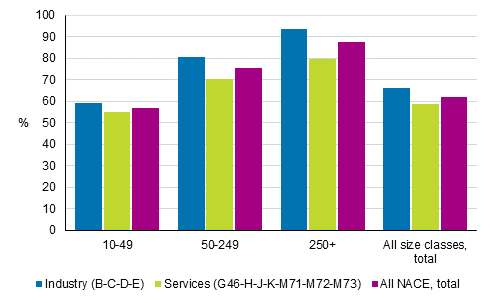3. Of the surveyed enterprises, 62 per cent were involved in innovation activity in 2016 to 2018
Sixty-two per cent of the enterprises in the Innovation Survey reported that they had had innovation activity in 2016 to 2018. Over one-third of enterprises, 37 per cent, reported introduction of product innovations to the market, and an even bigger share, 48 per cent of enterprises had implemented innovations related to their business processes during the three-year survey period.
The share of enterprises with innovation activity has grown in recent years, because the share has climbed up to over 60 per cent in the latest two surveys. In earlier surveys good one-half of the surveyed enterprises reported having had innovation activity.
An enterprise is considered to be an enterprise involved in innovation activity if it has had innovations in the survey period, that is, it has introduced to the market or adopted new or improved products or processes or it has had activity aiming at their introduction.
Innovation activity has become more general in all size categories, but particularly among medium-size enterprises in the survey, or those employing 50 to 249 persons. In previous surveys good 60 per cent of enterprises in this size category reported innovation activity, in the latest two surveys the share of enterprises with innovation activity had exceeded 75 per cent among medium-size enterprises.
As in previous surveys, innovation activity was more common in manufacturing than in services in 2016 to 2018. In manufacturing 66 per cent of enterprises had innovation activity and in services 59 per cent. Examined by size category, the situation has remained unchanged, because among large enterprises innovation is still more general than in small enterprises.
Figure 1. Prevalence of innovation activity in total industry and service industries by enterprise size category in 2016 to 2018, share of enterprises

Among manufacturing industries, innovation activity was most widespread in 2016 to 2018 in the pharmaceutical industry (C21), in the textile and clothing industry (C13-14), in the manufacture of computers, electronic and optical products (C26), in the paper industry (C17), and in the manufacture of rubber and plastic products (C22). In the beverage industry (C11), as well as in the manufacture of electronic equipment (C27) and in the manufacture of machinery and equipment n.e.c. (C28) around 80 per cent of enterprises reported innovation activity. The most commonly innovating branches thus represented both small and bigger industries by number of enterprises.
In service industries innovation activity was most widespread in computer programming (J62), research and development (M72) and information service activities (J63).
Examined by number, among individual industries most innovating enterprises were found in wholesale trade (G46), computer programming (J62), architectural and engineering activities (M71 architectural and engineering activities; technical testing and analysis), manufacture of fabricated metal products (C25 manufacture of fabricated metal products, except machinery and equipment), the manufacture of machinery and equipment n.e.c. (C28) and the manufacture of food products (C10).
The majority of enterprises with innovation activity reported innovations during 2016 to 2018, that is, either new or improved products, that had been introduced to the market, or new or improved business processes that were implemented in the survey period. Fifty-six per cent of enterprises reported innovations, that is, 90 per cent of all enterprises with innovation activity.
Nearly one-third of enterprises reported ongoing projects at the end of the survey period aiming to accomplish innovations but that were not yet completed. Every tenth enterprise reported abandoned innovation projects during the survey period.
Forty-one per cent of enterprises were involved in research and development (R&D), which is in full counted in innovation activity. Around every fourth enterprise reported regular research and development, while 17 per cent said they had had practised R&D irregularly. About every fourth enterprise said they had contracted out R&D to other enterprises or organisations. However, research and development are seldom contracted out without the enterprise making its own research and development as well. The share of enterprises with own R&D or that contracted out R&D to others was in all 44 per cent of all enterprises and 70 per cent of enterprises with innovation activity.
The shares of enterprises having had or contracted out R&D are both in manufacturing and services now several percentage points higher than in the surveys between 2006 and 2014. Research and development have become more general precisely as regular own R&D has become more widespread and above all in service industries.
Further information about the generality of innovation activity by industry and size category
Enterprises’ innovation activity by industry group and enterprise size categoryEnterprises’ innovation activity by industry
Source: Innovation 2018, Statistics Finland
Inquiries: Mervi Niemi 029 551 3263, Heidi Pirkola 029 551 3246, tiede.teknologia@stat.fi
Director in charge: Mari Yl�-Jarkko
Updated 23.4.2020
Official Statistics of Finland (OSF):
Innovation [e-publication].
ISSN=1797-4399. 2018,
3. Of the surveyed enterprises, 62 per cent were involved in innovation activity in 2016 to 2018
. Helsinki: Statistics Finland [referred: 20.2.2026].
Access method: http://stat.fi/til/inn/2018/inn_2018_2020-04-23_kat_005_en.html

